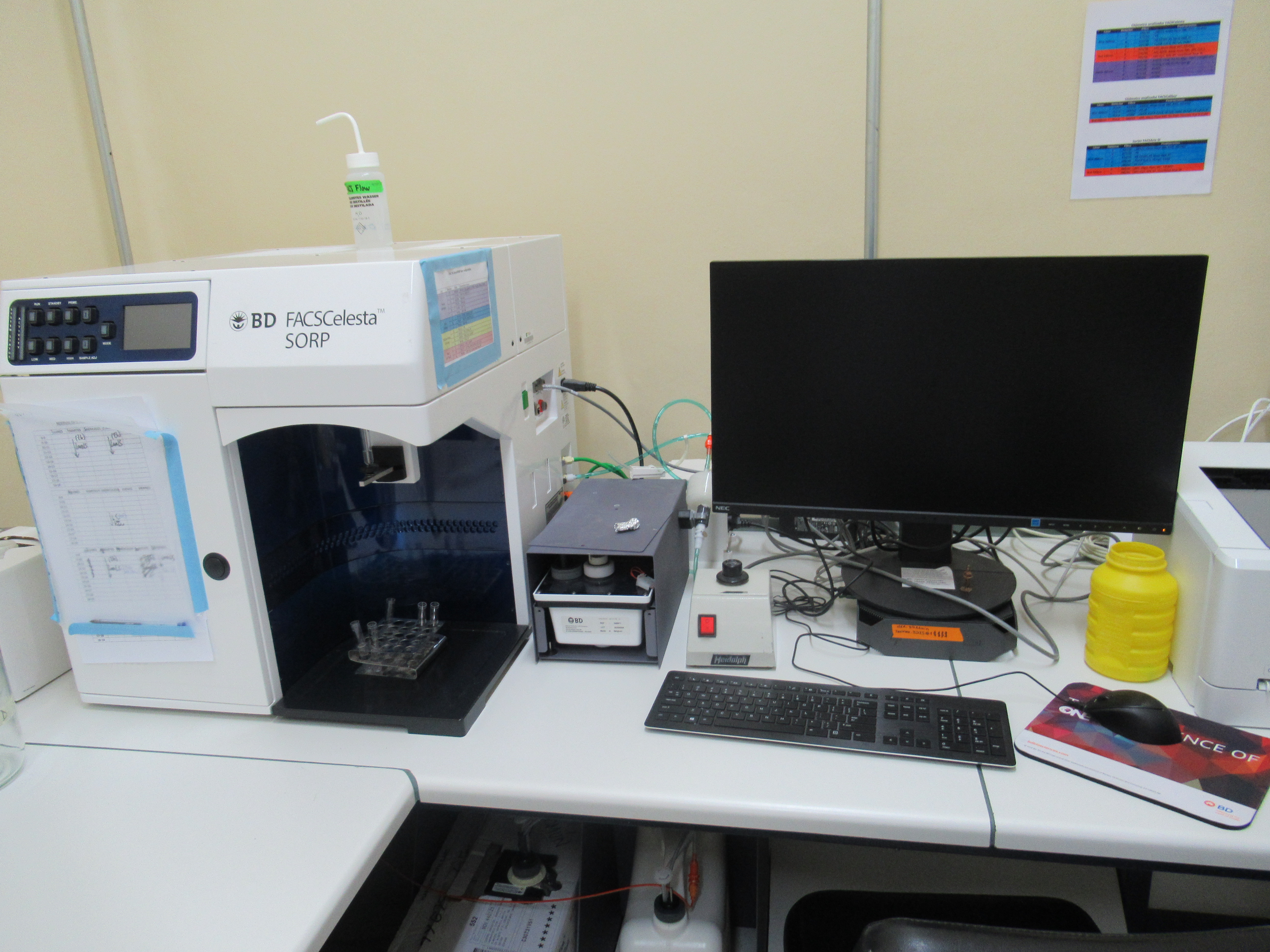I visited the office of the Permanent Representative of the Czech Republic to the FAO and WFP in Rome as part of the Erasmus+ mobility program from 10th June to 14thJune, 2024. I had the opportunity to participate in the 175th Session of the FAO Council. It was very interesting and rewarding for me to be present at an international meeting focused on resolving global crises and humanitarian aid, particularly in the context of food security.
On October 1 - 4, 2024, Dr. Jan Urban represented our faculty at the meeting of the Aquaexcel 3.0 project in Turin, Italy. During the meeting, the results and outputs of the project for the past year were discussed. Among the partners, interest in the activity of the signal and image processing laboratory is growing considerably, several possible collaborations using the TNA program have been proposed.
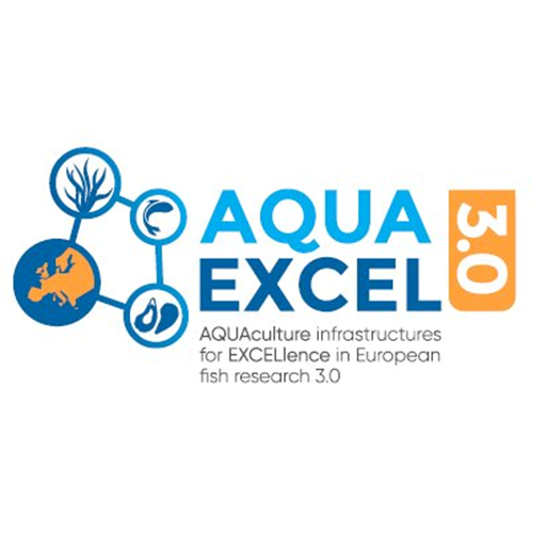
- Fotogalerie:
- Foto:
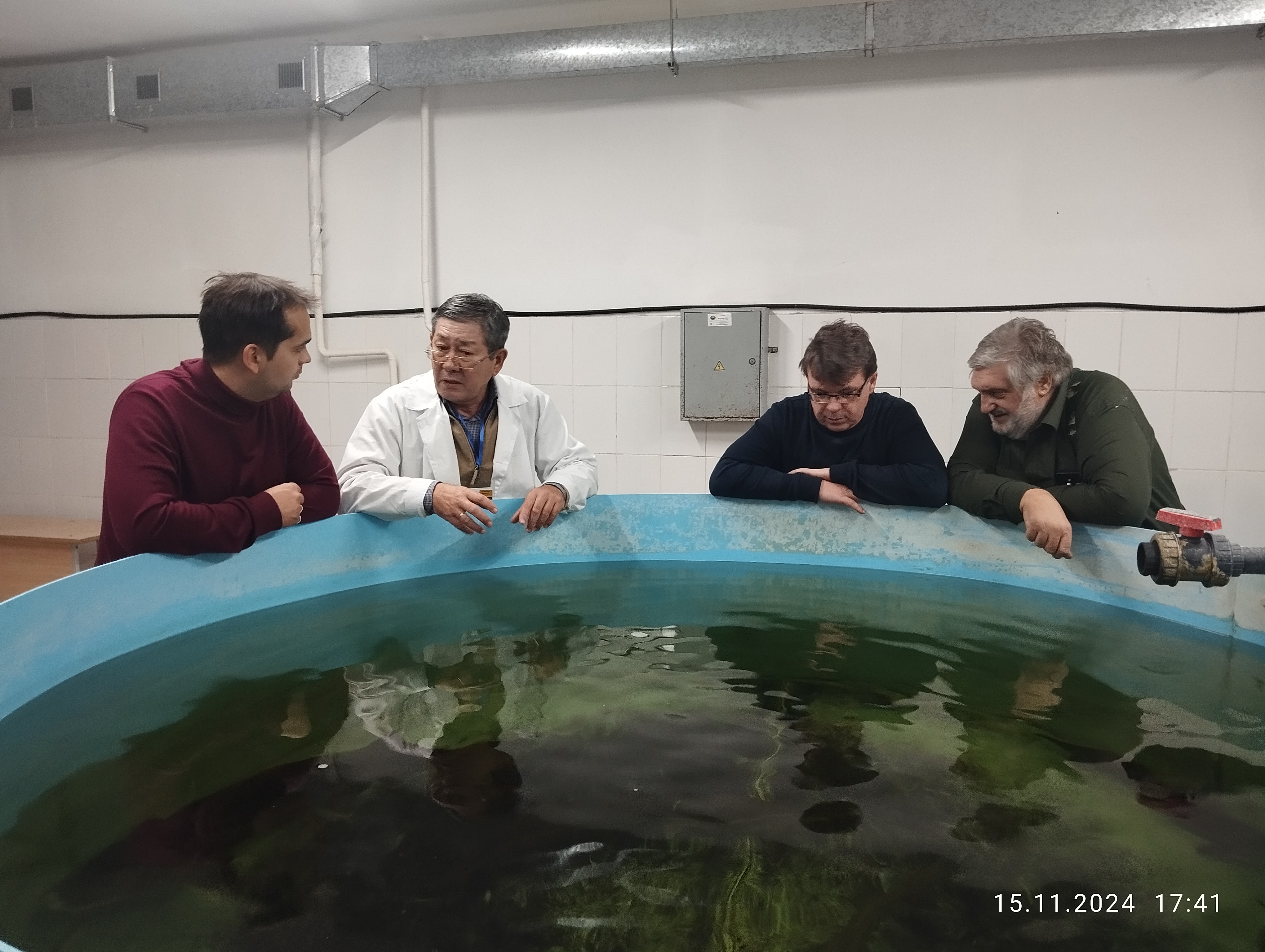
- Foto:
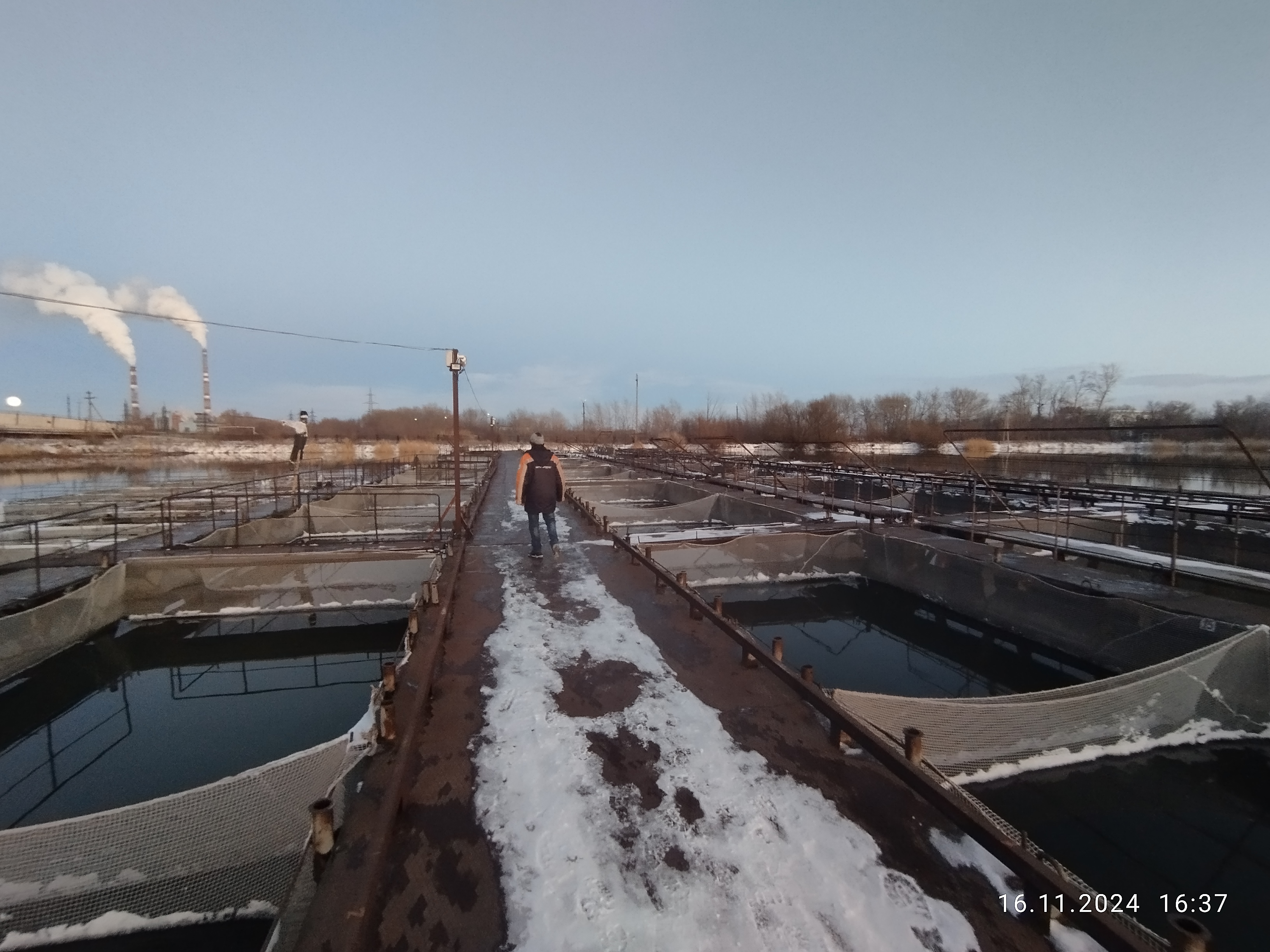
Between November 14thto 20th, I, together with my colleagues Tomáš Policar, Jan Kouřil, and Oleksandr Malinovskyi, conducted a business trip to Astana, the capital of Kazakhstan.
The purpose of the trip was to participate in a professional and educational meeting at S. Seifullin Kazakh Agro Technical University and the emerging Kazakh-Czech Aquaculture Research Center. During this visit, we prepared plans for international cooperation for 2025 and 2026 at the university leadership level, including discussions with Rector Prof. Kanat Tireuov and the center’s leadership, represented by its director and our colleague, MSc. Zhaxygalim B. Kuanchaleyev. The main focus of discussions and professional work revolved around the development of scientific (preparation and implementation of projects and experiments related to the intensive farming of pikeperch, reproduction, and controlled rearing of Siberian taimen) and pedagogical collaboration (exchange programs and internships for Master's and Ph.D. students).
During our stay, staff from FROV JU delivered special lectures to Master's students in the field of Fisheries. Additionally, the Czech delegation from the FFPW USB visited aquaculture facilities for pikeperch and sturgeon farming in Astana and Karaganda. We also met with the Czech ambassador, Ing. Pavel Šepeľák. This meeting facilitated discussions to clarify the most suitable procedure for granting study visas to Kazakh students interested in studying at our faculty. I believe that our visit to the center, the lectures for university students, and our renewed meetings with its representatives, as well as with fish producers in Kazakhstan, will contribute to the accelerated development of intensive collaboration between the two institutions. Furthermore, I hope this visit will enable our faculty to offer both its students and Kazakh students exciting international study opportunities, thereby expanding their global professional experience.
On 31st May 2024, we travelled with our colleagues Dr. Vojtěch Kašpar and Dr. Martin Hubálek to Bezirk Niederbayern, Fischereilicher Lehr- und Beispielsbetrieb Lindbergmühle in the frame of our joint project Šumava Fish Jewels, BYCZ01-020. The purpose of the trip was to have a working meeting with the owners and managers of the waters where the sampling of brown trout is to take place this year on the Bavarian side of Šumava, including waters managed by the Bayerischer Wald National Park and the Bezirk Niederbayern Fisheries Administration. The introduction by Dr. Stephan Paintner from the Bezirk Niederbayern fisheries management was followed by a presentation by Dr. Blabolil and his team from the Institute of Hydrobiology, Czech Acad. Sci. explaining the reasons for the project, the status of the brown trout populations in Šumava, the first results of the monitoring of the populations on the Czech side of Šumava and the sampling plans on the Bavarian side. The lecture by Prof. Flajshans, Dr. Kašpar and Dr. Hubálek presented the main mission of the Laboratory of Molecular, Cellular and Quantitative Genetics of the FROV JU, aspects of the living gene bank of Czech brown trout populations within the National Programme for the Conservation of Animal Genetic Resources, the progress of analyses of tissue samples of trout populations on the Czech side of Šumava, including the expected further development of sample processing and data analysis. Lectures were followed by a fairly extensive discussion. Finally, Dr. Paintner again summarized the main points for Bavarian fisheries managers and owners, including the necessary aspects imposed by Bavarian legislation.
Written by: Martin Flajšhans
The 22nd Fish Immunology and Vaccination Workshop, hosted at Wageningen University, Netherland was a resounding success. Organized by esteemed professors Geert Wiegertjes and Maria Forlenza, the workshop featured a series of insightful lectures from leading experts, an engaging poster session, and hands-on practical sessions. As an attendee, I had the privilege of delving into the latest advancements in fish immunology, gaining invaluable knowledge and practical skills that are crucial for my research. The workshop not only provided a platform for learning from the best in the field but also fostered vibrant discussions and networking opportunities with fellow researchers and professionals. This enriching experience has significantly contributed to my professional growth and research endeavors in aquatic science, particularly fish immunology, and I am grateful for the opportunity to have been a part of such a prestigious event. I would like to extend my heartfelt appreciation to the faculty for their generous financial support, which made my participation in this prestigious event possible.
- Fotogalerie:
- Foto:
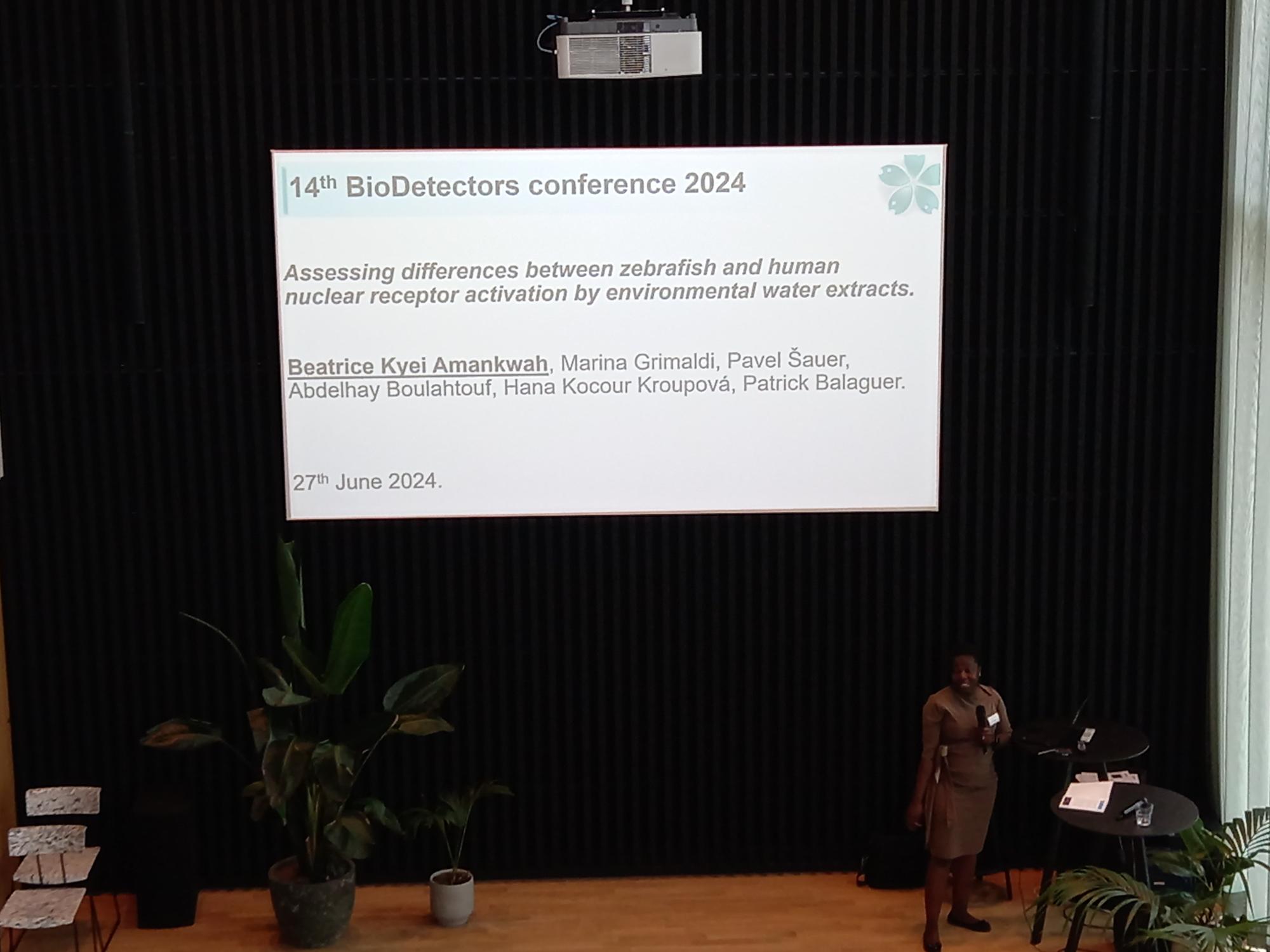
On June 27-28, 2024, we participated in the 14th BioDetectors international conference in Amsterdam, Netherlands, which was focused on the application of bioanalytical methods. We presented the results of our ongoing research through oral presentations. Our presented research was focused on monitoring in vitro biological activities in aquatic environments, identifying their sources and the substances responsible for them, and comparing these activities on human and fish receptors. Additionally, our trip included discussions about current and future collaborations with researchers from BioDetection Systems, b.v. (Netherlands) regarding in vitro biotests. We would like to thank the GAČR projects (20-04676X and 22-19136S), which enabled us to attend this conference.
Written by: Pavel Šauer a Beatrice Kyei Amankwah
In the framework of AQUAEXCEL3.0 technician transnational mobility exchange program, I undertook training activities at SINTEF facilities (Trondheim, Norway), from May 27th to June 2nd, 2024. I participated in planning of working week performed by technical SINTEF team. I actively engaged in sensors installation and maintenance, data transfer and storage in the sea cages monitoring conditions. For the data processing and design of imaging devices it is very useful to know the conditions of sensors placement and operation on the monitoring site. The gained knowledge will be used in the implementation of the faculty projects for welfare monitoring analysis.
During the period from 27th November to 2nd December 2024 I participated in various feed production activities at the Center for Feed Technology (FôrTek), Norway. These activities encompassed material grinding and mixing, extrusion, drying, and oil coating. Furthermore, I hold a seminar on research focus. This mobility was supported by the PPSŘ mobility program.
European catfish as (not only) a Portuguese problem
On 01-06-06 we visited Instituto Politéctico de Santarém in Portugal to expand the possibilities of cooperation, the main objective of which is to help our colleagues from southwestern Europe with the problem of eradication of the large catfish (Silurus glanis). This species, which is not native to Portugal, is the top freshwater predator in this country and has completely taken over its natural habitat in some parts of Portugal, causing considerable disturbance to native species.
Portugal, as the country with the highest fish consumption in the EU, has little experience of processing and distributing it, mainly because people avoid it and there is no demand for it on the market. There is thus no real economic motivation for more massive catches, which can only be carried out by licensed companies. They are mainly confronted with the problem of humane killing and refrigeration in a combination that would ensure the preservation of the high quality of the muscle, which has a significantly lower fat content than in the Czech Republic.
In addition to a visit to an educational facility focused on invasive fish species and the promotion of a stable ecosystem (https://www.fozdozezere.pt/index.php?sec=part4), we had the opportunity to have a professional discussion with the manager of one of the sections of a large national system for the intake and distribution of sea fish (https://www.docapesca.pt/), and with whom we agreed on further cooperation, especially in the possibilities of transferring their very sophisticated system of recording and quality control to the conditions of Czech Republic.
Another very interesting benefit was the 2-day company of Robert Hughes (https://www.researchgate.net/profile/Robert-Hughes-34), an excellent expert on fish ecosystems, with whom we discussed the comparison of US and European conditions and the link between fish consumption and freshwater aquaculture.
The greatest source of interesting information, however, were our colleagues from Escola Superior Agrária (part of IPS) who gave us a detailed presentation on both the legislative and practical parts of the issue and the steps they have taken towards the desired changes. We are still processing all the experiences and outputs from this trip and discussing further possibilities of cooperation on the topic with our colleagues from Institute of Hydrobiology in České Budějovice.
This business trip was supported by the Erasmus+ programme.
On April 7th – 11th, 2024, FFPW USB staff (Bořek Drozd, Jan Kubec, Lukáš Veselý, Filip Ložek, Martin Vlk) carried out the next phase of installing telemetry gates to monitor the movement of rheophilic fish species in the Slovak part of the Danube in the project area of the LIFE Living Rivers project (101069837/LIFE21-IPE-SK-Living Rivers).Furthermore, the activity of incubating sterlet eggs in incubators put directly into the Danube, which is also part of the LIFE project, was started.
RNDr. Bořek Drozd, Ph.D.
On April 15th – 21st, 2024, FFPW USB staff (Bořek Drozd, Jan Kubec, Lukáš Veselý, Filip Ložek, Martin Vlk) completed the installation of telemetric gates and began a telemetric study focused on monitoring the movement of rheophilic fish species in the Slovak part of the Danube in the project area of the project LIFE Living Rivers (101069837/LIFE21-IPE-SK-Living Rivers). Furthermore, the activity of incubating sterlet eggs in incubators put directly into the Danube, which is also part of this LIFE project, was completed.
RNDr. Bořek Drozd, Ph.D.
On May 16, 2024, FFPW USB staff (Bořek Drozd, Filip Ložek) took part in the working meeting "From Iron Gates to Gabčíkovo Water Structure", hosted by the Water Management Research Institute (Bratislava, Slovakia). In a total of 10 presentations accompanied by a rich plenary discussion, the international team (WWF, ICPDR, BOKU, DSTF, etc.) discussed the current process of making the Danube passable for fish at the Iron Gate and proposals and strategies for making the Gabčíkovo, Čunovo and Dunakiliti dams passable for fish migration as part of the LIFE Living Rivers project (101069837/LIFE21-IPE-SK-Living Rivers). B. Drozd presented the scope of activities and the current results of the USB on the Danube within the framework of this project, especially with regard to the flagship fish group of the Danube - sturgeons.
RNDr. Bořek Drozd, Ph.D.
On June 25, 2024 FFPW USB staff (Bořek Drozd, Miloš Buřič, Filip Ložek, Tomáš Randák, Pavel Lepič) participated in the 2nd IP LIFE Living Rivers project meeting (101069837/LIFE21-IPE-SK-Living Rivers), which was held at the Water Management Research Institute (Bratislava, Slovakia). The event was attended by representatives from all institutions, ongoing project activities, their progress and results during the project implementation period were presented.Afterwards, the 1st meeting of the Steering Committee of the project followed, where the members of the committee and their deputies were introduced, progress in the project solution was presented, and key topics for the future of the project were discussed.
Written by: RNDr. Bořek Drozd, Ph.D.
- Fotogalerie:
- Foto:
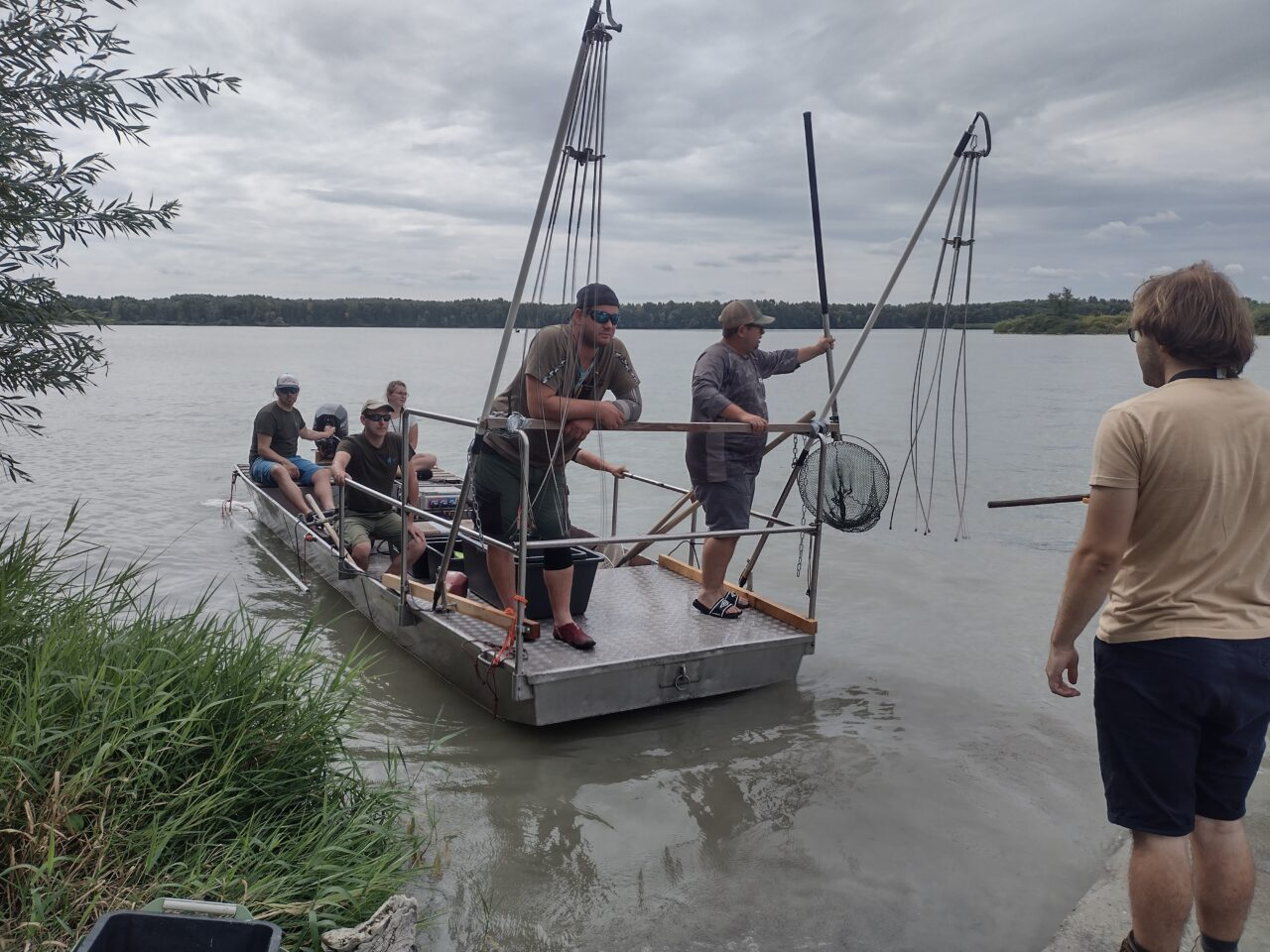
On August 4-9, 2024, FFPW USB staff (Bořek Drozd, Filip Ložek, Lukáš Veselý, Jan Kubec, Martin Vlk, Marek Let, Ismael Soto, Paride Balzani, Pavel Svoboda, Filip Kupka, Martin Šindler) monitored the species composition of fish communities in the Old Danube and side river system in Slovakia. The activity took place within the integrated LIFE project Living Rivers (101069837/LIFE21-IPE-SK-Living Rivers). The event was also attended by other project partners and representatives of interested groups such as the State Nature Protection of the Slovak Republic, the Ministry of the Environment of the Slovak Republic, the Research Institute of Water Management, WWF Slovakia and the Slovak Angling Union. The survey revealed the current dismal state of the former inland Danube delta, whose ecosystem is gradually degrading (water shortage, poor flow conditions, water overheating, intensive sedimentation) due to the construction and improper management of the operation of the Gabčíkovo barrage system.
Written by: RNDr. Bořek Drozd, Ph.D.
On May 11-14, 2025, the staff of the FFPW USB (Bořek Drozd, Filip Ložek, Lukáš Veselý, Jan Kubec, Martin Vlk, Pavel Staněk) downloaded data from telemetric gates installed on water structures and in free-flowing passages in the Slovak-Hungarian part of the Danube in order to determine the migratory activity of the sterlet (Acipenser ruthenus), asp (Leuciscus aspius) and barb (Barbus barbus) in the project area of the integrated LIFE project Living Rivers (101069837/LIFE21-IPE-SK-Living Rivers). In addition maintenance, service and repair of the installed telemetric equipment were performed.
- Fotogalerie:
- Foto:
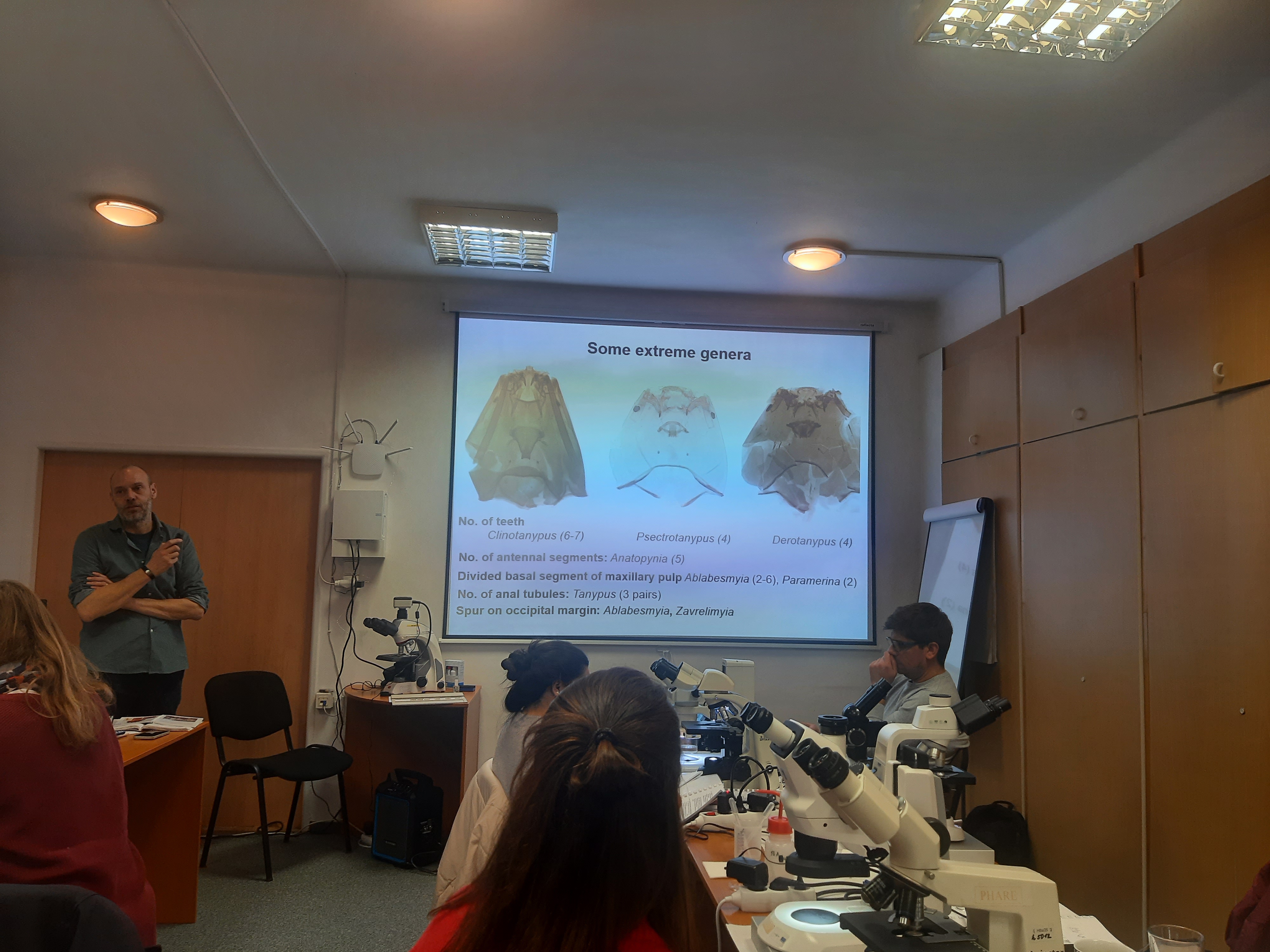
5th European workshop on Chironomidae identification methodology (EWCIM) 2025
From January 27 to 31, 2025, a workshop focused on the morphological identification of chironomid larvae was held at the Slovak Academy of Sciences in Bratislava. The workshop was attended by 14 participants and 4 instructors from a total of 9 countries. Participants were introduced to the ecology of chironomids, larval identification methods (both traditional and computer-assisted), and some interesting applications of chironomid morphology in research on their biodiversity and environmental studies. The workshop covered the subfamilies and genera of European chironomids in detail, including species-specific characteristics for many genera. However, the main part of the workshop was dedicated to the practical identification of larvae from numerous species using identification keys (each participant had access to a stereomicroscope and a microscope for this purpose).
I took part in three-month (March-May 2024) internship at theNational Institute of Biology (NIB) in Ljubljana (Slovenia)titled "Detection of fish and amphibian species from still water and sediment samples using the eDNA approach" at theDepartment of Organisms and Ecosystems Research,National Institute of Biology (NIB), under the supervision of Dr. David Stanković. I engaged in comprehensive training focused on mastering the accuracy of eDNA sampling techniques and methodology for species detection. The internship involved sampling water and sediment from natural ponds and river arms, followed by extensive laboratory work. This included eDNA extraction, assessment of extract quality, PCR amplification, and preparation of sequencing libraries. I also participated in bioinformatics analysis to identify species from molecular data.Our preliminary results have been presented at the 5th Thematic Service Workshop on Biodiversity Observatory Automation hosted by LifeWatch Slovenia at NIB (26/04/2024). Additionally, I worked on the preparation of endemic fish tissues for whole genome sequencing. These activities were beneficial for my PhD studies and my future career. I gained many positive experiences from participating in this internship, thanks to the great colleagues at NIB. Lastly, I am deeply thankful to Erasmus+, the PPSŘ project, and the RVO ÚA laboratory for their financial support.
Researchers and PhD students from the Laboratory of Reproductive Physiology, Laboratory of Intensive Aquaculture, Laboratory of Germ Cells, and Laboratory of Molecular, Cellular, and Quantitative Genetics attended the “9th International Workshop on the Biology of Fish Gametes” in Leon, Spain, from 15th to 18th of July. Throughout these days, many well-known scientific researchers and students shared their results in the field of fish gamete biology through oral and poster presentations. Work of Rigolin Nayak and Essaikiammal Sodalai was chosen by organization committee for a flash talk.
A guided tour through the city of Leon, as well as tickets for the cathedral of Leon, were provided by the organizing comity. The event was closed with a Gala Dinner where the attendees experienced traditional music and local food.
Oral presentations: Sergii Boryshpolets, Yu Cheng, Linan Gao, Vitaliy Kholodnyy, Rigolin Nayak, Anatolii Sotnikov, Songpei Zhang, Essaikiammal Sodalai Muthu Konar, Mohammad Abdul Momin Siddique, Laurine Mule Mueni, Mohammad Rashed, Martin Pšenička.
Poster presentations: Sergii Boryshpolets, Borys Dzyuba, Rigolin Nayak, Essaikiammal Sodalai Muthu Konar, João Ferreira, Nururshopa Eskander Shazada, Anatolii Sotnikov, Viktoriya Dzyuba, Vitaliy Kholodnyy.
Ganna Fedorova, Otomar Linhart participated conference too.
I am proud to highlight my participation in a 5-day intensive training under the supervision of Prof. Carolina Tafalla at the BSL3 Animal Health Research Center (CISA), Instituto Nacional de Investigación y Tecnología Agroalimentaria (INIA), Spanish Research Council (CSIC) in Madrid, Spain. The training encompassed key techniques including lymphocyte isolation from rainbow trout tissues, cell cultivation in L15 medium, specific phagocytosis assays, lymphocyte labeling with antibodies (anti-CD8, anti-MCH II, and anti-IgM), and flow cytometry analysis. This enriching experience has significantly enhanced my expertise in fish immunology, contributing to the faculty’s ongoing commitment to advanced research and professional development.I would like to express my heartfelt gratitude for generous financial support for this advanced training provided by an Erasmus training scholarship for employees, facilitated by the University of South Bohemia.
The two-month internship (from 21/10/2024 to 20/12/2024) was conducted at the Institute of Animal Science and Technology (ICTA) of the Universitat Politècnica de València, Department of Animal Science, under the supervision of Prof. Asturiano Nemesio, Juan Francisco. The primary aim of the internship was to gain deeper knowledge about European eel and shark sperm and to perform experiments exploring effective methods for short-term preservation of European eel sperm.
During my stay, I acquired a solid understanding of the basic physiology of eels and their sperm. My skills in scientific communication and the exploration of research questions were significantly enhanced. Furthermore, I established new connections and collaborations with other scientists in the field.









